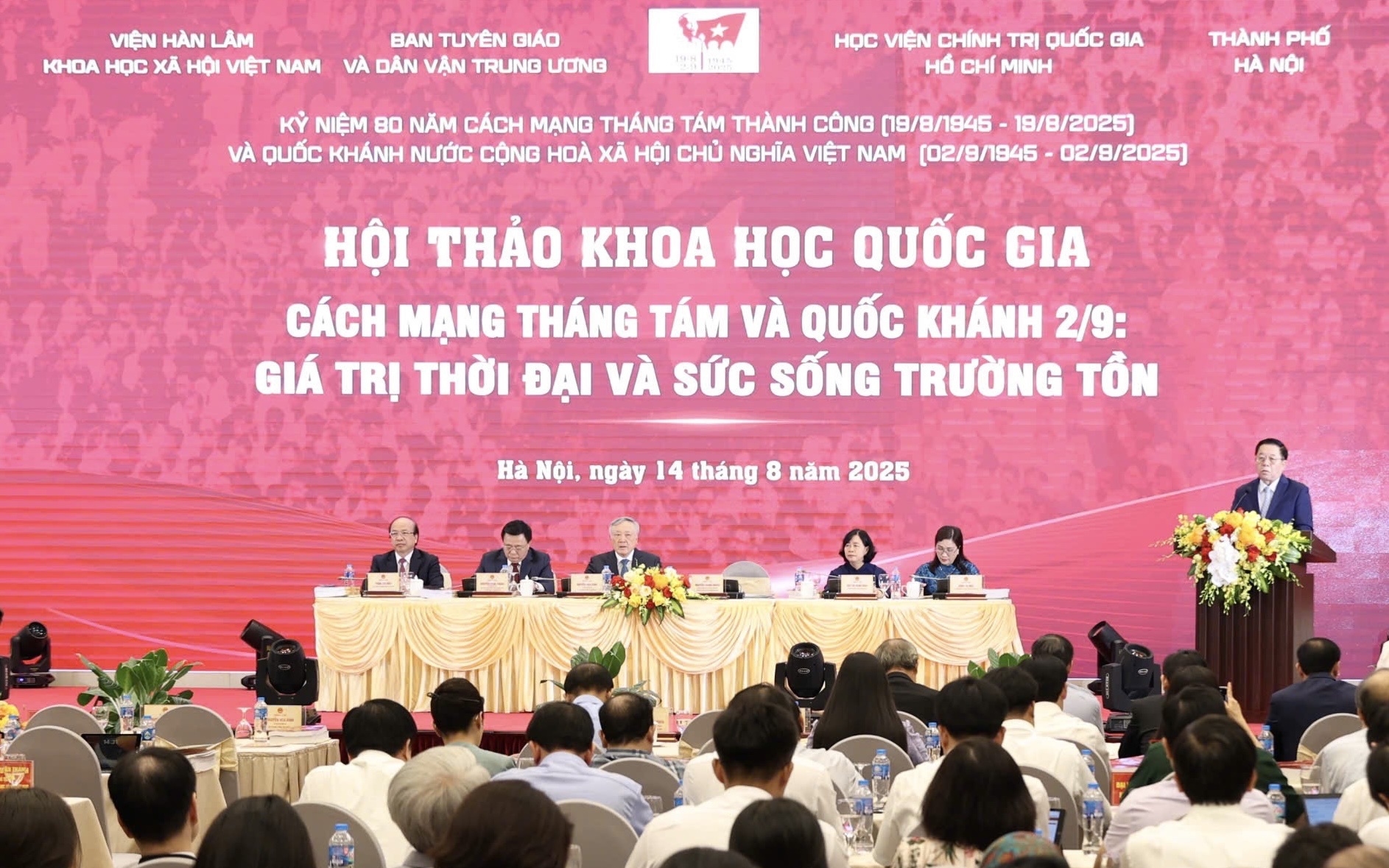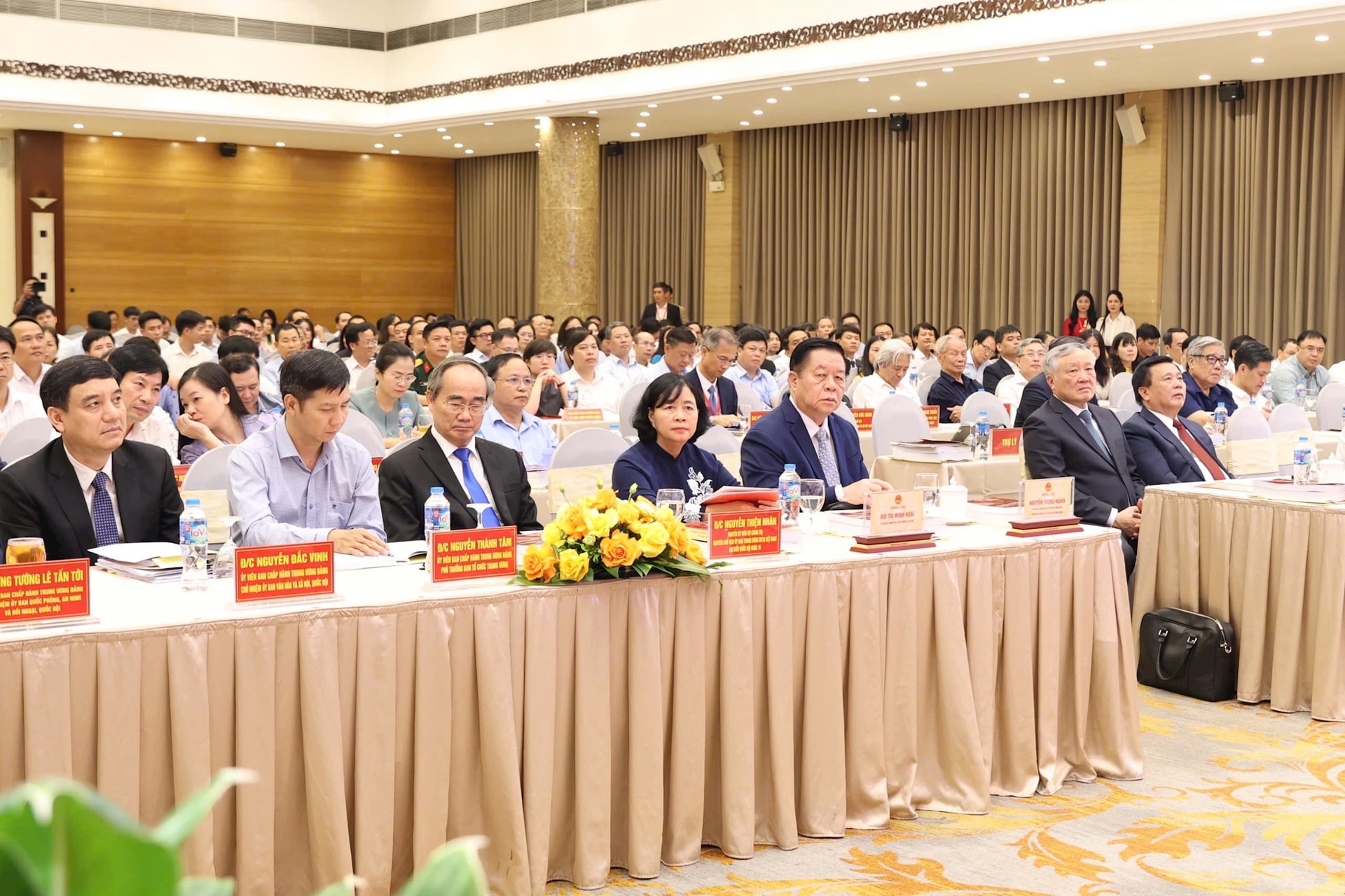This conference was one of the activities to commemorate the 80th anniversary of the August Revolution (August 19, 1945 – August 19, 2025) and the National Day of the Socialist Republic of Vietnam (September 2, 1945 – September 2, 2025).

Overview of the event.
Attending the conference were Politburo members: Nguyen Trong Nghia, Secretary of the Party Central Committee, Head of the Commission for Publicity and Mass Mobilization; Nguyen Hoa Binh, Standing Deputy Prime Minister; Nguyen Xuan Thang, Chairman of the Central Theoretical Council and Director of the Ho Chi Minh National Academy of Politics; and Bui Thi Minh Hoai, Secretary of the Hanoi Party Committee and Head of the Hanoi National Assembly Delegation.
Also attending the conference were Nguyen Thien Nhan, former Politburo member, former Chairman of the Central Committee of the Vietnam Fatherland Front, former Secretary of the Ho Chi Minh City Party Committee; members of the Party Central Committee; representatives of central ministries and agencies; as well as experts and scholars. From Hanoi, Standing Deputy Secretary of the City Party Committee Nguyen Van Phong was present.
Opening the conference, Nguyen Trong Nghia, Head of the Commission for Publicity and Mass Mobilization, recalled with emotion that before the historic autumn of 1945, the country was sunk in long-standing slavery. More than 80 years of French colonial rule had left the nation impoverished and destitute, while the people's basic rights to life, liberty, and the pursuit of happiness were mercilessly trampled.
In 1940, Japanese fascists invaded Indochina, and the French colonialists quickly surrendered, subjecting the Vietnamese people to a "double yoke," and driving them into extreme exploitation, both physically and spiritually.
Amid those dark days, the flame of revolution continued to smolder. Since its founding in 1930, the Communist Party of Vietnam, under the light of Marxism-Leninism, had steadfastly led the people through successive revolutionary movements from 1930 to 1945. The Party built political and armed forces, awakened and organized the masses, and established revolutionary bases, ready to seize the historic opportunity.
In August 1945, when Japanese fascists surrendered to the Allies, a once-in-a-millennium opportunity emerged. Within only 15 days, under the Party and President Ho Chi Minh's leadership, the entire nation rose in the General Uprising, smashed the chains of slavery, and seized power for the people.
On September 2, 1945, at Ba Dinh Square, President Ho Chi Minh, on behalf of the Provisional Revolutionary Government, solemnly read the Declaration of Independence, proclaiming to the world: "Vietnam has the right to be free and independent, and in fact has become a free and independent country."

Delegates at the event.
The August Revolution not only carried immense significance for the Vietnamese people but also had a profound influence on national liberation movements around the world.
From this victory, invaluable historical lessons were drawn: the decisive role of the Party and President Ho Chi Minh in every success, the ability to grasp opportunities, the mobilization of the great unity of the entire nation, and the absolute trust placed in the people.
Nghia emphasized that to ensure the success of the conference, discussions should focus on three major issues:
First, analyze in depth the historical context, developments, and factors that created the great victory of the August Revolution and National Day September 2; affirm the historical stature and contemporary values of this victory, thereby reaffirming that the path of national independence linked with socialism is an inevitable choice consistent with the laws of development and the trend of the times.
Second, inherit and promote the theoretical and practical values of the victory of the August Revolution in today's revolutionary cause; particularly the lesson of the "Party's will – the people's heart," and the art of seizing and holding power, to strengthen national unity.
Third, creatively apply these values and lessons in building, developing, and defending the Fatherland in the new era.
Nghia expressed confidence that the dedicated opinions, research results, and scientific arguments presented at the conference would help further clarify the theoretical and practical values of the August Revolution, affirm the revolutionary path chosen by the Party and President Ho Chi Minh, and consolidate confidence and unity of will and action, so that the entire Party, people, and armed forces firmly pursue the goal of national independence associated with socialism, steadfastly defend the country, and defeat all hostile schemes and distorted viewpoints.
Delivering a welcoming speech at the conference, Bui Thi Minh Hoai, Secretary of the Hanoi Party Committee, affirmed that the August Revolution was an event of epochal significance.
She said it was the victory of a correct revolutionary line, wise leadership, strategic vision, and the ability to seize a once-in-a-millennium opportunity, combining national strength with international forces. Hanoi had the honor and pride of being the starting point and foundation of the success of the General Uprising to seize power nationwide.
She recalled the everlasting image of tens of thousands of people gathered at Ba Dinh Square on September 2, 1945, solemnly swearing in the Declaration of Independence that "All the people of Vietnam are determined to devote all their spirit and strength, lives and property to maintain their independence and freedom."
"Alongside compatriots nationwide, Hanoi's people contributed immense effort, intellect, and sacrifice to defend the revolution's achievements and realize its noble goals: independence for the nation, and freedom and happiness for the people," said Hoai.
Reviewing Hanoi's historic journey over 80 years, marked by many proud achievements, she noted that the capital now stands before new opportunities and prospects for faster and more sustainable development.
The Party Committee, authorities, and people of Hanoi are determined to build the capital into a "Cultured – Civilized – Modern" city, worthy of its role as the national political-administrative center and a major hub of economy, culture, education, science, technology, and international integration.
Affirming that the National Scientific Conference on "The August Revolution and National Day September 2: Contemporary Values and Enduring Vitality" held great scientific and practical importance, Hoai expressed her belief that the event would contribute to clarifying further the values of the August Revolution, and from there creatively apply them in building and developing the country, firmly defending the socialist Vietnam in the new stage.
"Through the conference, the Party Committee, authorities, and people of Hanoi would gain valuable experience to apply to the capital's construction and development," said Hoai.
Speaking on behalf of the Party and State leadership, Standing Deputy Prime Minister Nguyen Hoa Binh highlighted key lessons from the August Revolution. The first and most important, he said, was the wise and correct leadership of the Party. The victory of the August Revolution in 1945 demonstrated history's correct choice.
While many earlier patriotic movements had failed, the Communist Party of Vietnam succeeded because it embraced lofty ideals, adopted a correct line, faithfully represented the people's interests, relied primarily on its own strength, united the nation, carefully prepared forces, quickly seized the opportunity presented by "Japan and France fighting each other, and our action," and skillfully combined political struggle with armed uprising. Without the Communist Party, modern Vietnam would not exist. This fact is confirmed by history and practice.
He added that the revolution also offered other lessons: Marxism-Leninism and Ho Chi Minh Thought, under the banner of national independence and socialism, serve as the guiding light for the future.
The people are the invincible strength of the revolution. Patriotism is an enduring spiritual power. National unity is the "source of strength" and the "red thread" running through Vietnam's revolutionary history. Building a clean, strong Party remains the foundation for national development.
Binh noted that from 211 Party members at its founding in 1930, the Communist Party of Vietnam now has more than 5.6 million members. He stressed that by 2030, the centenary of the Party's founding, Vietnam aims to become a developing country with modern industry and upper-middle income.
By 2045, the centenary of the nation's founding, Vietnam plans to become a developed, high-income country, completing the 100-year national struggle and continuing its era of rise, prosperity, and strength.